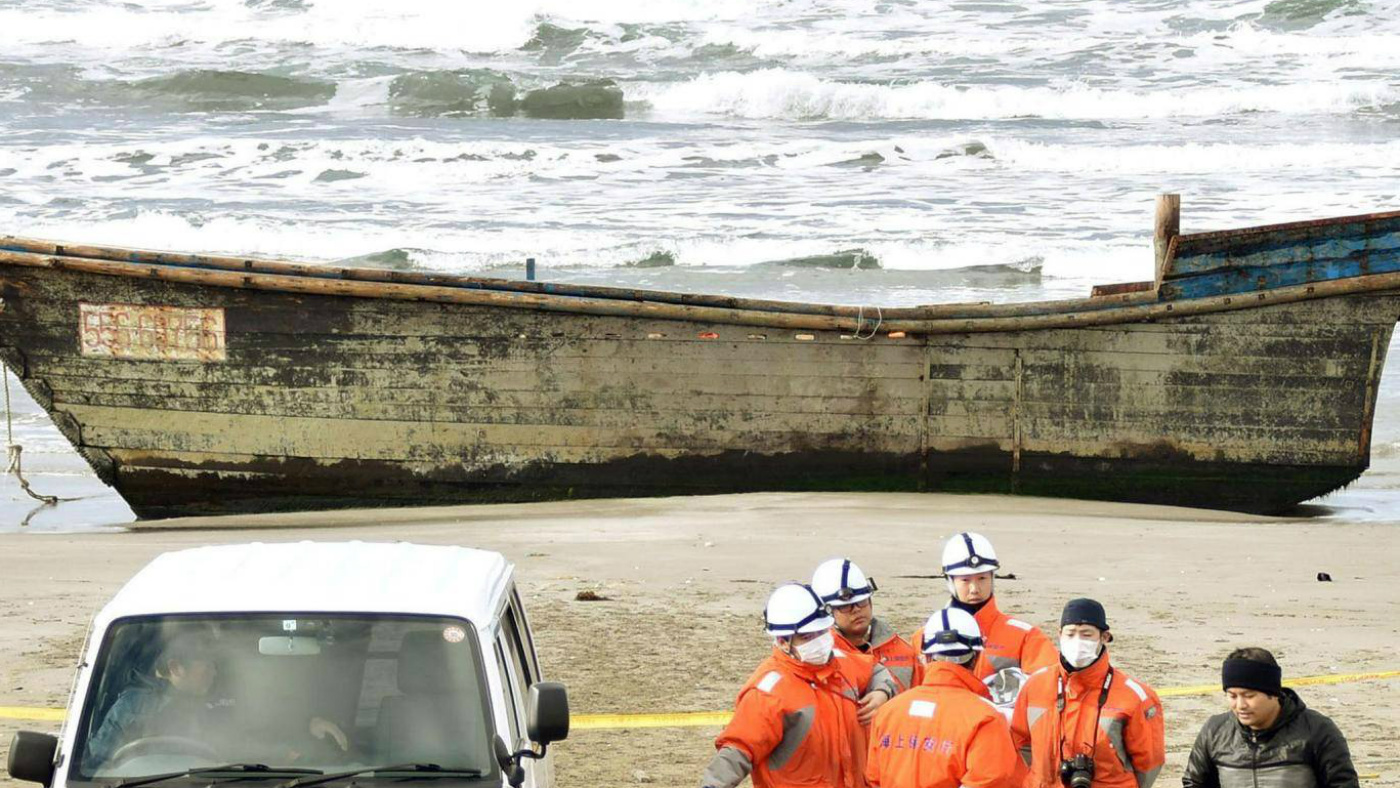Skeletons found on ‘ghost ships’ that wash up in Japan
Authorities unable to confirm origin of series of vessels coming ashore

A free daily email with the biggest news stories of the day – and the best features from TheWeek.com
You are now subscribed
Your newsletter sign-up was successful
At least four so-called “ghost ships” have washed up on Japan's west coast this month, some with decomposing bodies still on board.
While authorities haven't confirmed their origin, “signs suggest they're from North Korea,” says CNN.
The latest incident occurred when a small wooden ship containing eight bodies which had been partly reduced to skeletons washed up on a beach in the Sea of Japan.
The Week
Escape your echo chamber. Get the facts behind the news, plus analysis from multiple perspectives.

Sign up for The Week's Free Newsletters
From our morning news briefing to a weekly Good News Newsletter, get the best of The Week delivered directly to your inbox.
From our morning news briefing to a weekly Good News Newsletter, get the best of The Week delivered directly to your inbox.
The ship was found by the Japan Coast Guard (JCG) in the northern Akita Prefecture, days after two similarly partially decomposed bodies were found on the island of Sado.
Reuters reported that the two bodies were found with a pack of North Korean cigarettes and other belongings with Korean lettering.
Authorities are working to establish where the bodies found over the last week came from.
Japanese broadcaster NHK said the most recent boat, measuring about 7m (23ft) long, was found on a beach near Oga city. The vessel was missing a rotor blade and navigational devices.
A free daily email with the biggest news stories of the day – and the best features from TheWeek.com
Officials found the remains of eight people, some reduced to bones, while inspecting the boat.
The BBC's Celia Hatton says the appearance of “ghost ships” is thought to be a consequence of North Korea's attempts to satisfy widespread hunger by demanding huge quotas of seafood from fishermen.
Satoru Miyamoto, a professor at Seigakuin University and an expert on North Korea, told CNN the number of ships washing ashore on Japan's coast has risen since 2013.
“It's after Kim Jong Un decided to expand the fisheries industry as a way of increasing revenue for the military. They are using old boats manned by the military, by people who have no knowledge about fishing," Miyamoto said. "It will continue.”
Several North Korean fishermen rescued earlier this month by Japanese authorities “were also returned to the country, on their request, officials said, indicating that at least some of those washing up on their neighboring nation's shores are not attempting to flee there,” adds the broadcaster.
-
 The broken water companies failing England and Wales
The broken water companies failing England and WalesExplainer With rising bills, deteriorating river health and a lack of investment, regulators face an uphill battle to stabilise the industry
-
 A thrilling foodie city in northern Japan
A thrilling foodie city in northern JapanThe Week Recommends The food scene here is ‘unspoilt’ and ‘fun’
-
 Are AI bots conspiring against us?
Are AI bots conspiring against us?Talking Point Moltbook, the AI social network where humans are banned, may be the tip of the iceberg
-
 Epstein files topple law CEO, roil UK government
Epstein files topple law CEO, roil UK governmentSpeed Read Peter Mandelson, Britain’s former ambassador to the US, is caught up in the scandal
-
 Iran and US prepare to meet after skirmishes
Iran and US prepare to meet after skirmishesSpeed Read The incident comes amid heightened tensions in the Middle East
-
 Israel retrieves final hostage’s body from Gaza
Israel retrieves final hostage’s body from GazaSpeed Read The 24-year-old police officer was killed during the initial Hamas attack
-
 China’s Xi targets top general in growing purge
China’s Xi targets top general in growing purgeSpeed Read Zhang Youxia is being investigated over ‘grave violations’ of the law
-
 Panama and Canada are negotiating over a crucial copper mine
Panama and Canada are negotiating over a crucial copper mineIn the Spotlight Panama is set to make a final decision on the mine this summer
-
 Why Greenland’s natural resources are nearly impossible to mine
Why Greenland’s natural resources are nearly impossible to mineThe Explainer The country’s natural landscape makes the task extremely difficult
-
 Iran cuts internet as protests escalate
Iran cuts internet as protests escalateSpeed Reada Government buildings across the country have been set on fire
-
 US nabs ‘shadow’ tanker claimed by Russia
US nabs ‘shadow’ tanker claimed by RussiaSpeed Read The ship was one of two vessels seized by the US military